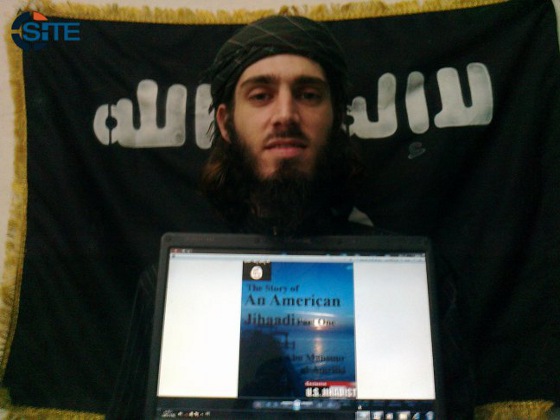
Shabaab's intelligence service, the Amniyatt Mukhabarat, is thought to have tracked down and killed American jihadist Omar Hammami and a Brit known as Osama al Britani after a clash in central Somalia. Hammami is wanted by the US government for his jihadist activities in Somali and ties to al Qaeda, and is a Specially Designated Global Terrorist.
Several Somalis in Bay province said that a large Shabaab force attacked Hammami and his small group of followers who were hiding out in a village near Dinsoor, the BBC reported. An Egyptian known as Khadap al Masri, who was with Hammami, is said to have surrendered to Shabaab forces.
Shabaab forces reportedly took the bodies of Hammami and al Britani from the scene of the attack. Shabaab has not officially claimed credit for the attack, but unnamed Shabaab officials are said to have confirmed Hammami's death.
Hammami is said to have granted an Interview with Voice of America Somalia more than a week ago. In the interview, he said he had renounced his ties to Shabaab and al Qaeda but still considered himself a "terrorist."
Hammami, who is better known as Abu Mansour al Amriki, is the most well-known foreign fighter in Somalia. Hammami occupied a prominent place in Shabaab's propaganda arm. He also served as a recruiter, financier, and military commander. He was even seen with Shabaab's top leaders at a public eulogy for slain al Qaeda emir and founder Osama bin Laden in May 2011. The US added him to the list of specially designated global terrorists for his ties to al Qaeda in July 2011 and offered a $5 million reward for information leading to his captured in March 2013.
But after Abu Abdullah al Muhajir, whom the FBI believes to be Mostafa Jehad, an American who has risen in the ranks of Shabaab and has been identified as al Qaeda's emissary to Shabaab, appeared in the video in November 2011, Hammami's star was in decline. In early 2012, Hammami released a video claiming that his life was in danger and that foreigner fighters are at odds with Shabaab's leaders. Shabaab has disputed the claims, and has countered that Hammami is a narcissistic self-promoter who has taken advantage of his high-profile media presence to sow dissent between the Somali group and foreign fighters. Hammami and a small group of foreign fighters then broke with Shabaab and went in hiding. Zubayr reportedly sent intelligence agents to assassinate Hammami.
The dispute between Hammami and Zubayr created rifts within Shabaab's top leadership cadre. In a fatwa released earlier this year, Ibrahim Afghani, Hassan Dahir Aweys, Sheikh Abu Mansur Robow, and two other Shabaab leaders all accused Godane of being heavy-handed in his treatment of Hammami and two other foreign fighters.
Zubayr responded by targeting the Shabaab leaders who disagreed with him. In June, Afghani, who has had ties to top al Qaeda leaders for decades, and another Shabaab leader were gunned down by Shabaab intelligence forces [see LWJ report, Shabaab confirms 2 top leaders were killed in infighting].
Aweys fled to his tribe and then surrendered to the Somali government. Robow was said to have been negotiating with the Somali government, but the reports were never confirmed. Robow is now said to be sheltering with his tribe in Bakool.
Hammami's death signals that Zubayr is intent on consolidating his hold on Shabaab after the group suffered losses during an African Union and Somali military offensive that began in 2011. While Shabaab has lost overt most control of major town and cities in southern and central Somalia, it still dominates many villages and rural areas.